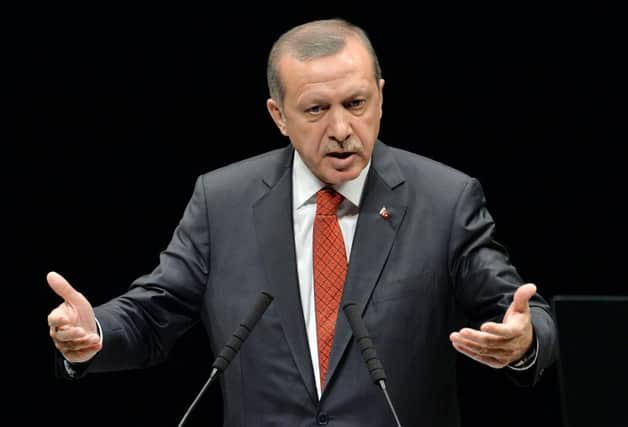Turkey: Hundreds of police dismissed


Some of the officers – who included senior commanders, and members of the financial and organised crime, smuggling and anti-terrorism units – were reportedly moved to traffic duties.
Police and prosecutors have continued to make arrests, which yesterday targeted the state railway company and a port in the west of the country.
Advertisement
Hide AdAdvertisement
Hide AdMr Erdogan portrays the raids and arrests as a “dirty plot” by an Islamic cleric, Fethullah Gulen.
Details of the accusations have not been made public, but are believed to relate to corruption in construction and infrastructure projects, and Turkey’s gold trade with Iran, according to Turkish newspaper reports. Prominent business people, the sons of three cabinet ministers and state officials are among those detained for questioning.
The government has hit back by sacking or reassigning hundreds of police officers across the country since the crisis broke with a day of raids and arrests on 17 December.
A second inquiry into large infrastructure projects championed by Mr Erdogan, including a rail tunnel beneath the Bosphorus strait in Istanbul, has been blocked by the government.
Around 350 officers in Ankara, including members of the financial and organised crime, smuggling and anti-terrorism units, were dismissed or reassigned overnight to new roles including traffic or district duties, media reports said. According to the Hurriyet daily, about 1,700 police have been dismissed or reassigned in Istanbul and Ankara alone.
Some would have been directly linked to the inquiries, while others may have been removed because of links to the Hizmet (“Service”) movement of US-based Mr Gulen, which Mr Erdogan now describes as an intolerable “state within a state”.
The two were close allies when Mr Erdogan’s AK Party was first elected in 2002, but have fallen out in the last couple of years over disagreements in policy towards America and Israel and a recent attempt by Mr Erdogan to close down the private schools that are the centre of the global Hizmet network.
Meanwhile, prosecutors have deepened their investigations, with at least 25 more people, including public officials, detained as part of an investigation into the activities of a port in the Aegean province of Izmir, broadcaster CNN Turk said.
Advertisement
Hide AdAdvertisement
Hide AdEight officials from state railway company TCDD were among those detained in the raids, the company said in a statement, denying reports its headquarters had been searched.
The corruption scandal is shaking economic confidence at a time when the lira currency is languishing around record lows, inflation is rising and growth slowing. As much as its Islamist-rooted ideology, the AK Party’s support has relied on its avowed commitment to fight corruption and its economic record.
Mr Erdogan and the Hizmet movement – which exercises influence through a network of contacts built on sponsorship of schools and other social and media organisations – accuse each other of manipulating the police and compromising the independence of the judiciary. Hizmet denies unleashing the investigation.
“Purges … are being carried out of civil servants who are fulfilling their duties defined by the law,” Mr Gulen said in a letter to president Abdullah Gul, written as the row intensified in late December but only published by the pro-government Yeni Safak newspaper on Monday.